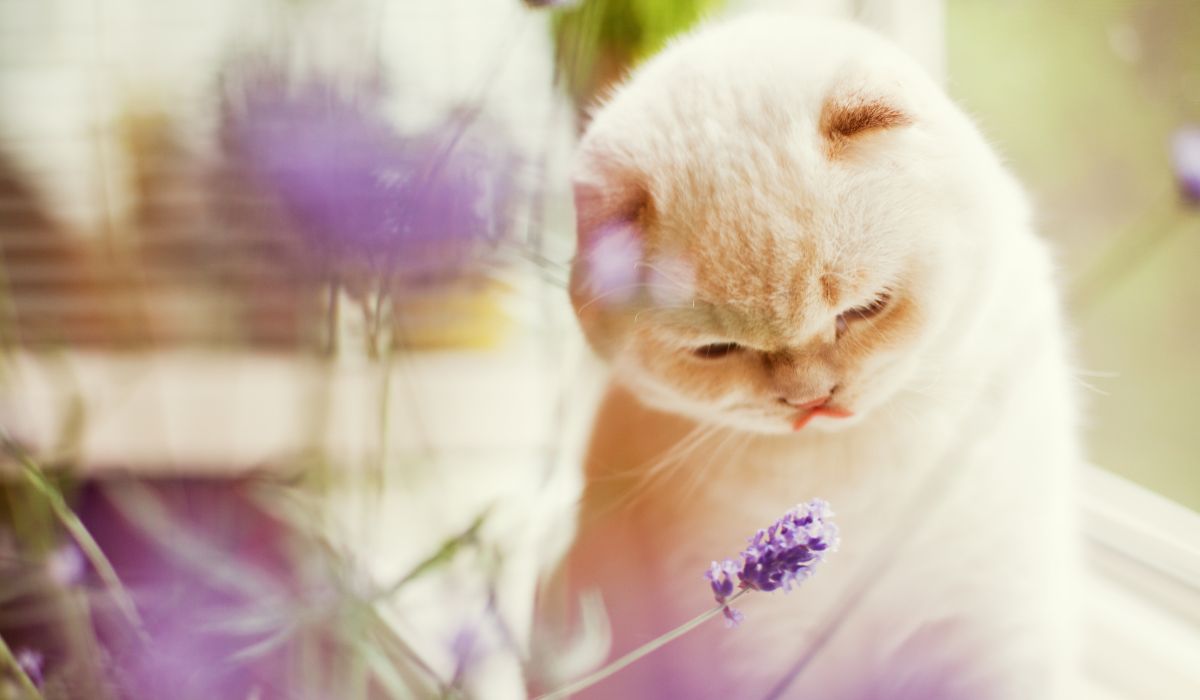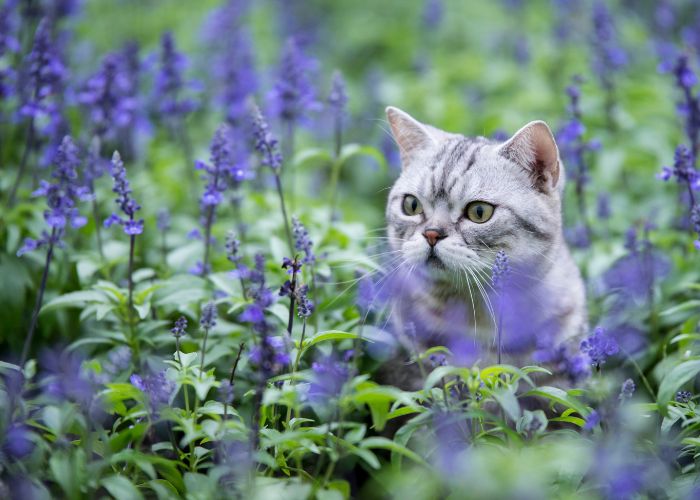Fields of purple lavender look great in any backyard, but if you have cats, you need to ask: Can cats eat lavender?
I’ve never had the space to grow a lavender field, but having some plants in a windowsill pot would be enough to soothe my soul. Knowing how curious my cats are, I knew they’d be attracted by the smell and interested in exploring the taste of this pretty plant. Finding out if lavender was safe for them to eat was number one on my list!
IMPORTANT: At stuffaboutcats.com, we regularly consult with licensed veterinarians and other industry experts. However, the information found on stuffaboutcats.com should not be viewed as veterinary advice. We do our best to help you better understand your cats, but the information on this blog is not a substitute for veterinary guidance.
In this article, I share what I found out about the safety of lavender for cats to help you make the best decision for yours!
Can Cats Eat Lavender?
Whether cats can eat lavender is a highly debated question. There are many opinions and facts, and none seem to agree.
The form of lavender your cat is most likely to consume – the plant – is not toxic to them. It poses a minor threat to their health, and they can safely ingest small amounts of it.
An upset stomach is the worst that can happen when your kitty eats the lavender plant.
Learn more about Is Lavender Good For Cats?
What Can Happen If My Cat Eats Lavender?
If your cat took a little nibble of the lavender plant on your windowsill, they’d be okay. You should, however, be concerned if they ate more than this! Large amounts of lavender could become toxic or cause an internal blockage in your cat’s digestive tract.
Lavender contains compounds that can be toxic to cats, and certain parts of the lavender plant contain high amounts of this compound. If you suspect your kitty was exposed to high doses of lavender, the best thing would be to keep an eye on them and look out for any symptoms of internal blockage or lavender poisoning.
Is It Safe To Use Lavender Essential Oils Around My Cat?
No. Cats lack the liver enzyme necessary to break down the toxic compounds in lavender, and essential oils have high concentrations of it.
Using lavender essential oils around your cat can lead to lavender poisoning, which could be fatal. Even just a drop of oil on your kitty’s skin can cause irritation, and a lick from the diffuser could be lethal.
If a drop of oil falls on your cat’s skin or fur, give them a warm bath with some cat shampoo and watch out for any strange symptoms. The oil can cause a chemical burn on your cat’s skin, and when they lick the spot, a burn on their tongue. Luckily, they can recover from this if it isn’t too bad.
If your kitty consumes too much lavender, do not try to make them vomit or give them any medicine without the go-ahead from the vet. Fortunately, there are some signs and symptoms that you could look out for before it gets to this point.
Signs Of Lavender Poisoning In Cats
- Appetite loss
- Coughing
- Diarrhea
- Difficulty breathing
- Drooling
- Low heart rate
- Nausea
- Vomiting
- Watery eyes
- Weakness
If your cat shows any of these signs, it could be symptoms of lavender poisoning, and you should take them to the vet for an immediate check-up!
How To Protect Your Cat From Lavender Poisoning
House And Garden Plants
If your kitty enjoys nibbling in your garden, opt for plants that are safe for them to consume. Catnip is an excellent example of one!
On your windowsill, one or two lavender plants will do no harm, but try to avoid creating fields of this flower in your backyard.
Essential Oils
While essential oils hold many benefits for you, they can be fatal to your feline if you don’t use them correctly. It’s best to keep essential oils and diffusers away from your kitty if you don’t have the go-ahead from a vet and proper instructions on how to use them.
Lavender Products
Lavender-infused soaps and air fresheners should be kept out of your cat’s reach. Besides the plant, infused products can be toxic to cats, and the products you expect from the least have the highest concentration of lavender.
My Cat Overate Lavender What Now?
Blockage: If your kitty consumed too much lavender and obtained an internal blockage, the vet will have to remove this obstruction with surgery.
Lavender Poisoning: Cats with symptoms of lavender poisoning are typically put on an IV fluid drip to rehydrate them and eliminate the toxins.
Chemical Burn: A bad chemical burn on the tongue could also leave them unable to eat, in which case the vet will feed them through a tube in their stomach.
Liver Damage: Lavender poisoning can cause liver damage. In this case, the vet will monitor the severity of it and possibly put your cat on medication.
Final Words
Lavender is only mildly toxic to cats, and if you keep a few plants in your backyard or on a windowsill, your cats will probably be okay. You just need to keep an eye on your plants to know when your kitty has nibbled too much of them.
If this happens, watch out for any signs of trouble and take your cat to the vet for immediate treatment! To play it safe, I suggest placing your plants in a spot that your kitty won’t easily reach.
I hope this article helped you determine how toxic lavender is for cats. If you have any more questions about plants and their safety for your feline, ask them in the comments!
Can cats eat dry lavender?
Yes.
Cats can eat dried lavender as an occasional snack.
Why do cats love lavender?
Lavender has a distinguishable smell, and cats are often attracted to this. The aroma will likely draw your kitty in, but some cats don't like it at all.
Is fresh lavender toxic to cats?
Fresh lavender is mildly toxic to cats, and while your kitty may be okay after eating one or two flowers, they'll get sick if they ingest too much.
Are cats allergic to lavender scents?
It's unlikely that your feline will be allergic to the scent of lavender, but they may find it unpleasant.
Read more about Is Cinnamon Bad For Cats And Dogs?

